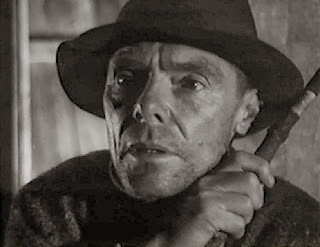... aka: Rape on the Moor
... aka: Roses Bloom on the Grave in the Meadow
... aka: Roses Blood on the Moor Grave
Directed by:
Hans H. König
In a small country village, lovely young blonde Dorothee Aden (Ruth
Niehaus) has attracted the attention of two very different men. The
first is Ludwig Amelung (Armin Dahlen), a nice guy architect who's
been away in the big city and is beginning to do quite well for himself
there. He's back in town visiting his mother Sophie (Lotte Brackebusch)
and bragging about the modern apartment blueprints he's just sold when Dorothee catches his eye. The other man is big, brutish,
violent and hot-tempered Dietrich Eschmann (Hermann Schomberg), a
well-off local farmer who already has a lover, maid Fiete (Gisela von
Collande), but is obsessed with Dorothee. He's quite pushy when he's
around her and goes so far as to get the consent of Dorothee's parents for
a marriage proposal. Unfortunately for him, she's not the least bit
interested. Dorothee's parents however, at least her father (Konrad
Mayerhoff), seem to side with Dietrich. Nevertheless, Dorothee is more
interested in Ludwig and the two quickly fall in love. He decides to
eventually propose to her himself once he tends to some business.
Dietrich gets pissed at what's going on and, madly in love with Dorothee,
decides to destroy their romance. He slashes the tires on Ludwig's car so
he and Dorothee cannot go on a trip, which leads to a
(horribly-choreographed) fist fight, which leads to a drunken Dietrich
trying to stab his rival with a switchblade in a pub. Ludwig has to go
away to Hamburg for a meeting and Dietrich uses this opportunity to really
force himself upon the object of his unwanted affections. After church, he
follows Dorothee through a field, pins her down and rapes her on top a
grave, but it's no ordinary grave, but one that holds with it a local
superstition of "The Roses of Wilhelmina." 300 years ago during the Thirty
Years War, a Swedish general (also Schomberg) gained the trust of a German
girl named Wilhelmina (also Niehaus). After he raped her, she led him into
the moors and the two were never seen or heard from again. Someone left a
tombstone behind bidding farewell to Wilhelmina, where a big, lone rose
bush began to grow around the grave marker and continues to grow to this
day. Local superstition has it that the roses are bewitched. Will history
be repeating itself.
Roses is basically one part melodrama, one part romance and one
part ambiguous and possibly supernatural revenge tale. The dramatics and
accompanying music score are pretty hokey and the symbolic elements are of
the baseball-bat-over-the-head school of subtlety unless you missed one of
the 5000 other Euro 'art' films that link up rosebuds and virginity. Still,
this is worth checking out strictly for its visuals. It's beautifully
photographed in black-and-white and has some breathtaking scenery. The
director has a deep love and appreciation for nature, which is evident in
lots of long, loving, lingering shots of the outdoor locations.
Silhouettes of trees, plants, windmills, horses, field workers and other
things stand out from the horizon, lone trees stand isolated in flat
fields, the sun shines through the clouds, boats sail along small creeks,
horse-drawn carriages travel down dirt paths and tall grass blows in the
breeze. These shots are very nicely framed and create an intoxicating
atmosphere; an impact lessened a bit by a story that's not dated so well
over the years. I know films need to be put into context to when they were
made but modern viewers are going to be downright offended by some of what
goes down here. And rightfully so! You may want to skip the next paragraph
if you don't want the ending spoiled cause that's just what I'm about to
do.
You still here? You're just asking for it, aren't you? So here goes. Not only does
the Dietrich character not get what he has coming to him, but he's not
even punished for the violent acts and rape he's committed. To make
matters even less palatable, the ending seems to want to warm our hearts
with the mere idea that he learned a valuable lesson from what he's done!
Depictions of the weak female characters are also probably going to rub
anyone under the age of 80 the wrong way. Instead of discussing what's
happened with her future husband, a post-rape Dorothee simply tries to
kill herself since her "virtue" is no longer intact. In her defense, it's
possible she's the reincarnation of - or possessed by - the Wilhelmina
character, so that may explain that. There is no such excuse for
Dietrich's lover Fiete. He manhandles her, lusts after another woman,
rapes another woman and then kicks her out of the house so he can be with
the rape victim, and there she is at the end cradling him in her arms
professing her love. It's impossible to celebrate love between a man who
deserves to be castrated and thrown in prison and a pathetic, spineless
doormat who desperately need to see a therapist.
Lead actress Niehaus was dubbed Germany's answer to Rita Hayworth back in
her day. She reportedly rejected the advances of - and a marriage proposal
from - Orson Welles in real life. Roses never received much of an American release
and remains mostly unseen in this country till this day.
★★1/2






















No comments:
Post a Comment